- Home
- Octavia E. Butler
Bloodchild and Other Stories Page 11
Bloodchild and Other Stories Read online
Page 11
3. Write. Write every day. Write whether you feel like writing or not. Choose a time of day. Perhaps you can get up an hour earlier, stay up an hour later, give up an hour of recreation, or even give up your lunch hour. If you can’t think of anything in your chosen genre, keep a journal. You should be keeping one anyway. Journal writing helps you to be more observant of your world, and a journal is a good place to store story ideas for later projects.
4. Revise your writing until it’s as good as you can make it. All the reading, the writing, and the classes should help you do this. Check your writing, your research (never neglect your research), and the physical appearance of your manuscript. Let nothing substandard slip through. If you notice something that needs fixing, fix it, no excuses. There will be plenty that’s wrong that you won’t catch. Don’t make the mistake of ignoring flaws that are obvious to you. The moment you find yourself saying, “This doesn’t matter. It’s good enough.” Stop. Go back. Fix the flaw. Make a habit of doing your best.
5. Submit your work for publication. First research the markets that interest you. Seek out and study the books or magazines of publishers to whom you want to sell. Then submit your work. If the idea of doing this scares you, fine. Go ahead and be afraid. But send your work out anyway. If it’s rejected, send it out again, and again. Rejections are painful, but inevitable. They’re every writer’s rite of passage. Don’t give up on a piece of work that you can’t sell. You may be able to sell it later to new publications or to new editors of old publications. At worst, you should be able to learn from your rejected work. You may even be able to use all or part of it in a new work. One way or another, writers can use, or at least learn from, everything.
6. Here are some potential impediments for you to forget about:
First forget inspiration. Habit is more dependable. Habit will sustain you whether you’re inspired or not. Habit will help you finish and polish your stories. Inspiration won’t. Habit is persistence in practice.
Forget talent. If you have it, fine. Use it. If you don’t have it, it doesn’t matter. As habit is more dependable than inspiration, continued learning is more dependable than talent. Never let pride or laziness prevent you from learning, improving your work, changing its direction when necessary. Persistence is essential to any writer—the persistence to finish your work, to keep writing in spite of rejection, to keep reading, studying, submitting work for sale. But stubbornness, the refusal to change unproductive behavior or to revise unsalable work can be lethal to your writing hopes.
Finally, don’t worry about imagination. You have all the imagination you need, and all the reading, journal writing, and learning you will be doing will stimulate it. Play with your ideas. Have fun with them. Don’t worry about being silly or outrageous or wrong. So much of writing is fun. It’s first letting your interests and your imagination take you anywhere at all. Once you’re able to do that, you’ll have more ideas than you can use. Then the real work of fashioning them into a story begins. Stay with it.
Persist.
Afterword
I wrote this brief essay for the Writers of the Future anthology series (L. Ron Hubbard Presents Writers of the Future IX). This series showcases the work of new writers, and my essay is a compact version of a talk that I’ve given to groups of new writers.
The last word of the essay is its most important word. Writing is difficult. You do it all alone without encouragement and without any certainty that you’ll ever be published or paid or even that you’ll be able to finish the particular work you’ve begun. It isn’t easy to persist amid all that. That’s why I’ve called this mild little essay “Furor Scribendi”—“A Rage for Writing.” “Rage,” “Positive Obsession,” “burning need to write” … Call it anything you like; it’s a useful emotion.
Sometimes when I’m interviewed, the interviewer either compliments me on my “talent,” my “gift,” or asks me how I discovered it. (I don’t know, maybe it was supposed to be lying in my closet or on the street somewhere, waiting to be discovered.) I used to struggle to answer this politely, to explain that I didn’t believe much in writing talent. People who want to write either do it or they don’t. At last I began to say that my most important talent—or habit—was persistence. Without it, I would have given up writing long before I finished my first novel. It’s amazing what we can do if we simply refuse to give up.
I suspect that this is the most important thing I’ve said in all my interviews and talks as well as in this book. It’s a truth that applies to more than writing. It applies to anything that is important, but difficult, important, but frightening. We’re all capable of climbing so much higher than we usually permit ourselves to suppose.
The word, again, is “persist”!
-New Stories-
Amnesty
The stranger-Community, globular, easily twelve feet high and wide glided down into the vast, dimly lit food production hall of Translator Noah Cannon’s employer. The stranger was incongruously quick and graceful, keeping to the paths, never once brushing against the raised beds of fragile, edible fungi. It looked, Noah thought, a little like a great, black, mossenshrouded bush with such a canopy of irregularly-shaped leaves, shaggy mosses, and twisted vines that no light showed through it. It had a few thick, naked branches growing out, away from the main body, breaking the symmetry and making the Community look in serious need of pruning.
The moment Noah saw it and saw her employer, a somewhat smaller, better-maintained-looking dense, black bush, back away from her, she knew she would be offered the new job assignment she had been asking for.
The stranger-Community settled, flattening itself at bottom, allowing its organisms of mobility to migrate upward and take their rest. The stranger-Community focused its attention on Noah, electricity flaring and zigzagging, making a visible display within the dark vastness of its body. She knew that the electrical display was speech, although she could not read what was said. The Communities spoke in this way between themselves and within themselves, but the light they produced moved far too quickly for her to even begin to learn the language. The fact that she saw the display, though, meant that the communications entities of the stranger-Community were addressing her. Communities used their momentarily inactive organisms to shield communication from anyone outside themselves who was not being addressed.
She glanced at her employer and saw that its attention was focused away from her. It had no noticeable eyes, but its entities of vision served it very well whether she could see them or not. It had drawn itself together, made itself look more like a spiny stone than a bush. Communities did this when they wished to offer others privacy or simply disassociate themselves from the business being transacted. Her employer had warned her that the job that would be offered to her would be unpleasant not only because of the usual hostility of the human beings she would face, but because the subcontractor for whom she would be working would be difficult. The subcontractor had had little contact with human beings. Its vocabulary in the painfully created common language that enabled humans and the Communities to speak to one another was, at best, rudimentary, as was its understanding of human abilities and limitations. Translation: by accident or by intent, the subcontractor would probably hurt her. Her employer had told her that she did not have to take this job, that it would support her if she chose not to work for this subcontractor. It did not altogether approve of her decision to try for the job anyway. Now it’s deliberate inattention had more to do with disassociation than with courtesy or privacy. “You’re on your own,” its posture said, and she smiled. She could never have worked for it if it had not been able to stand aside and let her make her own decisions. Yet it did not go about its business and leave her alone with the stranger. It waited.
And here was the subcontractor signaling her with lightning.
Obediently, she went to it, stood close to it so that the tips of what looked like moss-covered outer twigs and branches touched her bare skin. She wore only shorts and
a halter top. The Communities would have preferred her to be naked, and for the long years of her captivity, she had had no choice. She had been naked. Now she was no longer a captive, and she insisted on wearing at least the basics. Her employer had come to accept this and now refused to lend her to subcontractors who would refuse her the right to wear clothing.
This subcontractor enfolded her immediately, drawing her upward and in among its many selves, first hauling her up with its various organisms of manipulation, then grasping her securely with what appeared to be moss. The Communities were not plants, but it was easiest to think of them in those terms since most of the time, most of them looked so plantlike.
Enfolded within the Community, she couldn’t see at all. She closed her eyes to avoid the distraction of trying to see or imagining that she saw. She felt herself surrounded by what felt like long, dry fibers, fronds, rounded fruits of various sizes, and other things that produced less identifiable sensations. She was at once touched, stroked, messaged, compressed in the strangely comfortable, peaceful way that she had come to look forward to whenever she was employed. She was turned and handled as though she weighed nothing. In fact, after a few moments, she felt weightless. She had lost all sense of direction, yet she felt totally secure, clasped by entities that had nothing resembling human limbs. Why this was pleasurable, she never understood, but for twelve years of captivity, it had been her only dependable comfort. It had happened often enough to enable her to endure everything else that was done to her.
Fortunately, the Communities also found it comforting—even more than she did.
After a while, she felt the particular rhythm of quick warning pressures across her back. The Communities liked the broad expanse of skin that the human back offered.
She made a beckoning motion with her right hand to let the Community know that she was paying attention.
There are six recruits, it signaled with pressures against her back. You will teach them.
I will, she signed, using her hands and arms only. The Communities liked her signs to be small, confined gestures when she was enfolded and large, sweeping hand, arm, and whole-body efforts when she was outside and not being touched. She had wondered at first if this was because they couldn’t see very well. Now she knew that they could see far better than she could—could see over great distances with specialized entities of vision, could see most bacteria and some viruses, and see colors from ultraviolet through infrared.
In fact the reason that they preferred large gestures when she was out of contact and unlikely to hit or kick anyone was because they liked to watch her move. It was that simple, that odd. In fact, the Communities had developed a real liking for human dance performances and for some human sports events—especially individual performances in gymnastics and ice skating.
The recruits are disturbed, the sub-contractor said. They may be dangerous to one another. Calm them.
I will try, Noah said. I will answer their questions and reassure them that they have nothing to fear. Privately, she suspected that hate might be a more prevalent emotion than fear, but if the subcontractor didn’t know that, she wouldn’t tell it.
Calm them. The subcontractor repeated. And she knew then that it meant, literally, “Change them from disturbed people to calm, willing workers.” The Communities could change one another just by exchanging a few of their individual entities—as long as both exchanging communities were willing. Too many of them assumed that human beings should be able to do something like this too, and that if they wouldn’t, they were just being stubborn.
Noah repeated, I will answer their questions and reassure them that they have nothing to fear. That’s all I can do.
Will they be calm?
She drew a deep breath, knowing that she was about to be hurt—twisted or torn, broken or stunned. Many Communities punished refusal to obey orders—as they saw it—less harshly than they punished what they saw as lying. In fact, the punishments were left over from the years when human beings were captives of uncertain ability, intellect, and perception. People were not supposed to be punished any longer, but of course they were. Now, Noah thought it was best to get whatever punishment there might be out of the way at once. She could not escape. She signed stolidly, Some of them may believe what I tell them and be calm. Others will need time and experience to calm them.
She was, at once, held more tightly, almost painfully—“held hard” as the Communities called it, held so that she could not move even her arms, could not harm any members of the Community by thrashing about in pain. Just before she might have been injured by the squeezing alone, it stopped.
She was hit with a sudden electrical shock that convulsed her. It drove the breath out of her in a hoarse scream. It made her see flashes of light even with her eyes tightly closed. It stimulated her muscles into abrupt, agonizing contortions.
Calm them, the Community insisted once again.
She could not answer at first. It took her a moment to get her now sore and shaking body under control and to understand what was being said to her. It took her a moment more to be able to flex her hands and arms, now free again, and finally to shape an answer—the only possible answer in spite of what it might cost.
I will answer their questions and reassure them that they have nothing to fear.
She was held hard for several seconds more, and knew that she might be given another shock. After a while, though, there were several flashes of light that she saw out of the corner of her eye, but that did not seem to have anything to do with her. Then without any more communication, Noah was passed into the care of her employer, and the subcontractor was gone.
She saw nothing as she was passed from darkness to darkness. There was nothing to hear but the usual rustle of Communities moving about. There was no change of scent, or if there was, her nose was not sensitive enough to detect it. Yet somehow, she had learned to know her employer’s touch. She relaxed in relief.
Are you injured? her employer signed.
No, she answered. Just aching joints and other sore places. Did I get the job?
Of course you did. You must tell me if that subcontractor tries to coerce you again. It knows better. I’ve told it that if it injures you, I will never allow you to work for it again.
Thank you.
There was a moment of stillness. Then the employer stroked her, calming her and pleasing itselves. You insist on taking these jobs, but you can’t use them to make the changes you want to make. You know that. You cannot change your people or mine.
I can, a little, she signed. Community by Community, human by human. I would work faster if I could.
And so you let subcontractors abuse you. You try to help your own people to see new possibilities and understand changes that have already happened but most of them won’t listen and they hate you.
I want to make them think. I want to tell them what human governments won’t tell them. I want to vote for peace between your people and mine by telling the truth. I don’t know whether my efforts will do any good, in the long run, but I have to try.
Let yourself heal. Rest enfolded until the subcontractor returns for you.
Noah sighed, content, within another moment of stillness. Thank you for helping me, even though you don’t believe.
I would like to believe. But you can’t succeed. Right now groups of your people are looking for ways to destroy us.
Noah winced. I know. Can you stop them without killing them?
Her employer shifted her. Stroked her. Probably not, it signed. Not again.
• • •
“Translator,” Michelle Ota began as the applicants trailed into the meeting room, “do these … these things … actually understand that we’re intelligent?”
She followed Noah into the meeting room, waited to see where Noah would sit, and sat next to her. Noah noticed that Michelle Ota was one of only two of the six applicants who was willing to sit near her even for this informal question-and-answer session. Noah had infor
mation that they needed. She was doing a job some of them might wind up doing someday, and yet that job—translator and personnel officer for the Communities—and the fact that she could do it was their reason for distrusting her. The second person who wanted to sit near her was Sorrel Trent. She was interested in alien spirituality—whatever that might be.
The four remaining job candidates choose to leave empty seats between themselves and Noah.
“Of course the Communities know we’re intelligent,” Noah said.
“I mean I know you work for them,” Michelle Ota glanced at her, hesitated then went on. “I want to work for them too. Because at least they’re hiring. Almost nobody else is. But what do they think of us?”
“They’ll be offering some of you contracts soon,” Noah said. “They wouldn’t waste time doing that if they’d mistaken you for cattle.” She relaxed back into her chair, watching some of the six other people in the room get water, fruit or nuts from the sideboards. The food was good and clean and free to them whether or not they were hired. It was also, she knew, the first food most of them had had that day. Food was expensive and in these depressed times, most people were lucky to eat once a day. It pleased her to see them enjoying it. She was the one who had insisted there be food in the meeting rooms for the question and answer sessions.

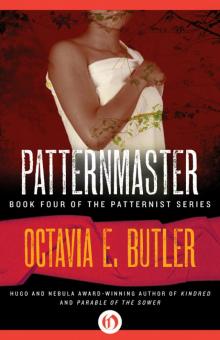 Patternmaster
Patternmaster Survivor
Survivor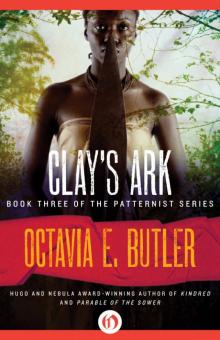 Clay's Ark
Clay's Ark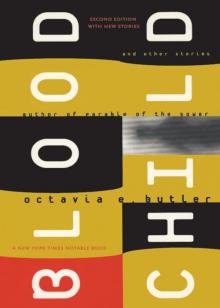 Bloodchild and Other Stories
Bloodchild and Other Stories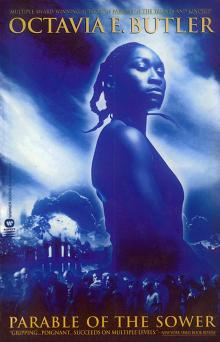 Parable of the Sower
Parable of the Sower Wild Seed
Wild Seed Fledgling
Fledgling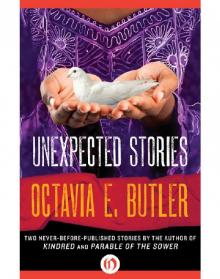 Unexpected Stories
Unexpected Stories Kindred
Kindred Lilith's Brood: Dawn / Adulthood Rites / Imago
Lilith's Brood: Dawn / Adulthood Rites / Imago Adulthood Rites
Adulthood Rites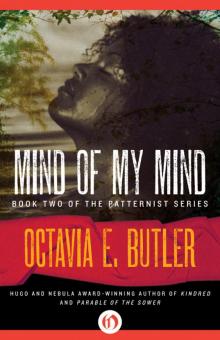 Mind of My Mind
Mind of My Mind Seed to Harvest
Seed to Harvest Lilith's Brood: Dawn, Adulthood Rites, and Imago (Xenogenesis Trilogy)
Lilith's Brood: Dawn, Adulthood Rites, and Imago (Xenogenesis Trilogy)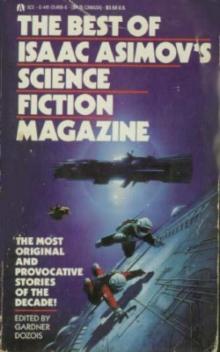 Bloodchild
Bloodchild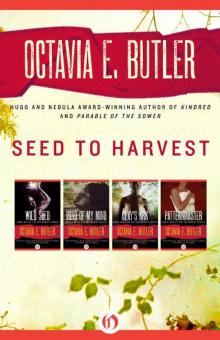 Seed to Harvest: Wild Seed, Mind of My Mind, Clay's Ark, and Patternmaster (Patternist)
Seed to Harvest: Wild Seed, Mind of My Mind, Clay's Ark, and Patternmaster (Patternist)